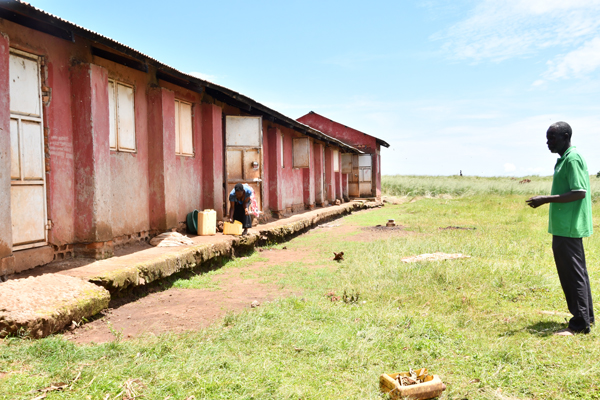Alonsio Omerikit’s tough experience of running an island school

Alonsio Omerikit, the head teacher of Myende Community Primary School, shows the state of his school that remains closed to learners and is not sure he will have enough funds to run it again. Photos/Edgar R. Batte.
What you need to know:
Even as the school continues to lose pupils and teachers, Alonsio Omerikit , the head teacher of Myende Community Primary, refuses to give up hope of giving the island’s children an opportunity to learn.
Alonsio Omerikit is a man of incredible faith and passion. These two traits would explain why he still has hope that his school Myende Community Primary School will one day open and welcome back its pupils and teachers against all odds..
Myende is a fishing village on Koome Island, near Ngamba Island Chimpanzee Sanctuary. Before the onset of the pandemic, island’s children attended the community school. The school had 160 pupils ranging from three to 12 years of age. They were taught by 10 teachers, qualified and unqualified volunteers.
Uncertain future
“When Covid-19 broke out, the government ordered the closure of all schools so the pupils were sent home to live with their parents. Presently, 13 of my female pupils have been reported to have got pregnant, three were married off by their guardians and 30 boys are actively practicing fishing,” a sad Omerikit reveals.
The school lost seven of its teachers who went back to their homes since they were no longer employed.
“When I talked to them about returning when schools finally reopen, they informed me that they had left the profession as well,” Omerikit shares.
The headmaster realised he was heading for a crisis when only seven pupils reported, five in Primary Five and two in Primary Four, back in June when schools were briefly reopened. Only two of the school’s teachers returned to the school.
“Another teacher called and promised to return. We enrolled another two to come and assist in teaching the pupils,” he adds.

Dedicated Primary Five pupil Caleb Tumuhimbise goes to school every day and spends days learning on his own.
Omerikit knows he is fighting stronger forces than he can handle on his own, that is why he is looking around for partners that can help him along. His biggest worry he says is the parents relaxed attitude towards educating their children. Most Ugandan fishing communities are notorious for high school dropouts and teen marriages and Myende is no exception.
“The parents I have talked to from the village say they do not have money to send their children back to school. I still have hope that they will find the means to raise school fees,” says the hopeful headmaster.
According to the head teacher, they need a number bigger than a mere seven pupils to be able to raise enough money to run and sustain the operations of the community school.
For now, they rely on support, or what is left of it, from non-government organisations (NGOs) such as the Ngamba Island Chimpanzee Sanctuary.
“Apart from the money raised by the school directly, Ngamba Island Chimpanzee Sanctuary and its partners helped build the school and donated reading materials. We have an apiary with about 15 hives in which we rear bees and do production of honey which we sell in turn to boost the school income,” explains Omerikit.
Reason to go on
The headmaster’s efforts are, however, rewarded by the determination of pupils such as Caleb Tumuhimbise. Although the schools remain closed, Tumuhimbise always shows up at the school and enters any class he finds open and sits alone revising his notes. Tumuhimbise, according to Omerikit is driven by the need to acquire academic excellence. He sits alone every day reading and rereading the same material until he feels he has mastered it before moving on to the next one.
Smartly dressed in his neat school uniform and barefooted, the Primary Five pupil, says he is studying to join the army because he wants to become a soldier.
Right now he is preparing himself to sit his Primary Leaving Examination (PLE) in the next two years at Myende Community Primary School.
But Tumuhimbise worries whether the school will still be open and whether he will be able to compete with other learners from the urban schools that continued with their lessons online or got private tutoring. Omerikit too worries that his pupils might not be getting the best instruction since he cannot afford to pay teachers enough money to motivate them. He pays a qualified teacher Shs250, 000 per month and Shs150, 000 for the non-qualified ones. With the fluctuation in the number of pupils, he is not eager for another reopening of schools come January 2022 because he does not know where he will get the funds to run the school.

Alonsio Omerikit the head teacher of Myende Community Primary
Alternative income
“Pupils whose parents live in the islands, are as nomadic as their guardians. They will pack and leave for another island following and chasing after the news of where fish is in plenty. Fishing is the only activity that is done here and almost 90 percent of the people rely on fishing, so when fish depletes they have to migrate and go to some other islands or landing sites where there is fish. When parents migrate, they go with their children, which sometimes causes a decrease in the population of the school. The school expenses mostly vary to the number of children available,” Omerikit narrates.
Koome has a population of about 70, 000 people with the biggest number of adults engaged in fishing from Lake Victoria for both business and subsistence livelihood.
To try and create a different source of income for the pupils and their families, the headmaster introduced apiary lessons so that by the time they complete school they have the idea and can use the skill and knowledge to earn a living.





